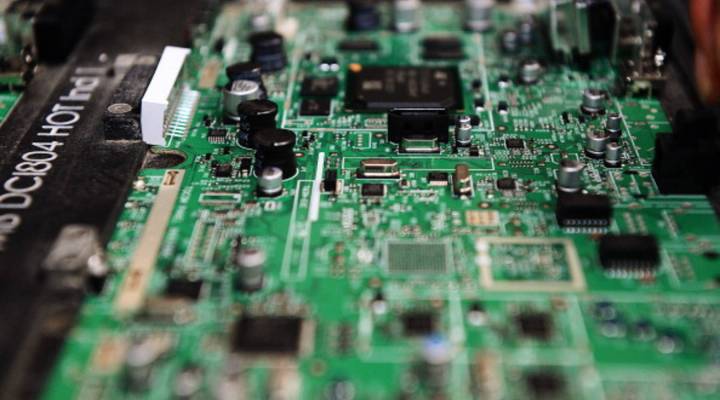
Electronics makers caught in the trade war

Motherboards and circuits are practically everywhere, but their components are mostly made overseas — and many are made in China. With electronic imports on the tariff list of Chinese goods, what’s in store for domestic electronic makers?
Marketplace host Kai Ryssdal spoke to Ann Fine, whose family has run DF Electronics in Cincinnati for more than four decades. She runs accounting and personnel for the company. The following is an edited transcript of their conversation.
Kai Ryssdal: Do me a favor and tell me what DF Electronics does. What do you make, and who do you make it for?
Ann Fine: We make printed circuit boards that go into a variety of mostly industrial controls — anywhere from medical furniture to pumps and anything in between.
Ryssdal: OK. So the reason we called you are those printed circuit boards and all the things that go with all those printed circuit boards. Where do you get your components?
Fine: Any given circuit board can have anywhere from a half a dozen to a couple hundred different components on it. Most electronic components are built overseas, and a lot of them are built in China.
Ryssdal: So as we sit here in a tariff economy, what is your exposure? You’re the accounts material manager. I’m sure you look at these line items every day. What are you seeing?
Fine: It’s frightening, and the thing is everyone involved, from the manufacturers down to us, is sort of making this up as we go. We’re seeing some tariff costs defined. We’re seeing some component costs simply go up. We’re seeing some distributors that haven’t done anything yet, even though we know that some of those products are tariff products.
Ryssdal: How do you keep the books? How do you keep the accounts when you don’t know what’s what?
Fine: Well, and that’s really the nightmare. We’re sort of making it up as we go, and the only solace is that literally everyone else in the business is doing the same thing. At the moment, I’m in the middle of drafting a letter to go out to all of our customers that basically says we’re going to do the best we can, but what’s likely to happen is that at the end of a purchase order we’ll look at our increased cost that we did not expect at the time that we quoted and we’ll do that as a one-time charge. And we’ll separate out tariff costs when we know them, but when they’re simply price increases, we don’t know where those came from.
Ryssdal: What’s your sense of how your customers are going to react? Or how have they been reacting since this has been going for a while? Or are they saying, “Ann, you can take this purchase order and invoice and you-know-what with it”? Or Are they working with you?
Fine: They really don’t have an option, because it’s the same for all of their board houses. So any of our competitors are going to have the same issue.
Ryssdal: What do you do, Ann, if as seems by all evidence now that this will not end anytime soon? What do you do if this keeps going for like another, I don’t know, 18 months, two years?
Fine: We’re going to be playing it by ear. The tariff costs will get factored in more and more as it becomes more apparent that they’re not going away. All of that really is to be determined and is, as you’re very well aware, it’s the unknown that’s the scariest thing in business.
There’s a lot happening in the world. Through it all, Marketplace is here for you.
You rely on Marketplace to break down the world’s events and tell you how it affects you in a fact-based, approachable way. We rely on your financial support to keep making that possible.
Your donation today powers the independent journalism that you rely on. For just $5/month, you can help sustain Marketplace so we can keep reporting on the things that matter to you.












